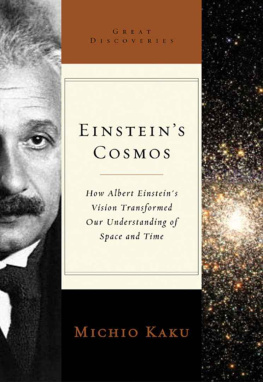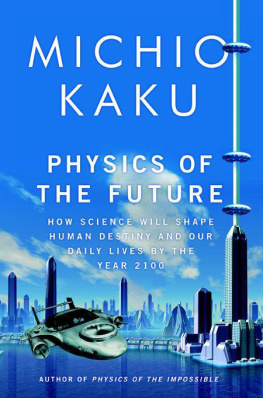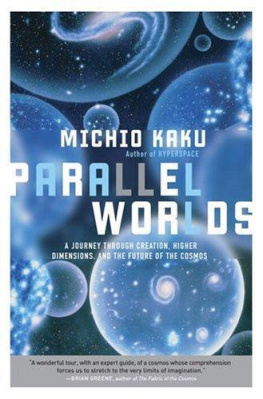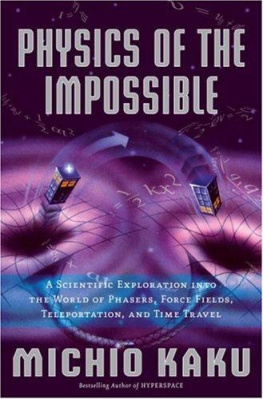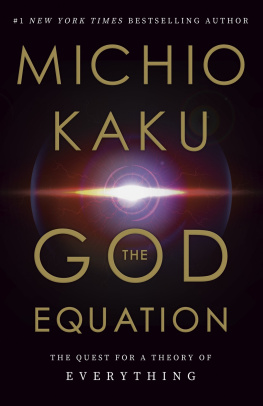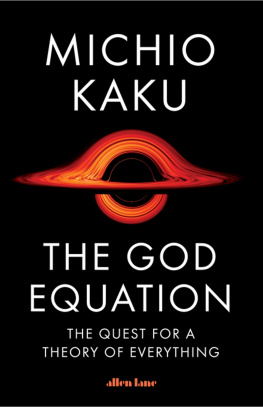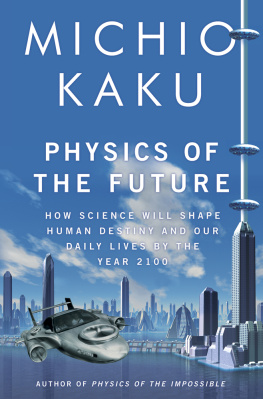Michio Kaku - Physics of the Future
Here you can read online Michio Kaku - Physics of the Future full text of the book (entire story) in english for free. Download pdf and epub, get meaning, cover and reviews about this ebook. publisher: Knopf Doubleday Publishing Group, genre: Romance novel. Description of the work, (preface) as well as reviews are available. Best literature library LitArk.com created for fans of good reading and offers a wide selection of genres:
Romance novel
Science fiction
Adventure
Detective
Science
History
Home and family
Prose
Art
Politics
Computer
Non-fiction
Religion
Business
Children
Humor
Choose a favorite category and find really read worthwhile books. Enjoy immersion in the world of imagination, feel the emotions of the characters or learn something new for yourself, make an fascinating discovery.

- Book:Physics of the Future
- Author:
- Publisher:Knopf Doubleday Publishing Group
- Genre:
- Rating:4 / 5
- Favourites:Add to favourites
- Your mark:
- 80
- 1
- 2
- 3
- 4
- 5
Physics of the Future: summary, description and annotation
We offer to read an annotation, description, summary or preface (depends on what the author of the book "Physics of the Future" wrote himself). If you haven't found the necessary information about the book — write in the comments, we will try to find it.
Michio Kaku: author's other books
Who wrote Physics of the Future? Find out the surname, the name of the author of the book and a list of all author's works by series.
Physics of the Future — read online for free the complete book (whole text) full work
Below is the text of the book, divided by pages. System saving the place of the last page read, allows you to conveniently read the book "Physics of the Future" online for free, without having to search again every time where you left off. Put a bookmark, and you can go to the page where you finished reading at any time.
Font size:
Interval:
Bookmark:
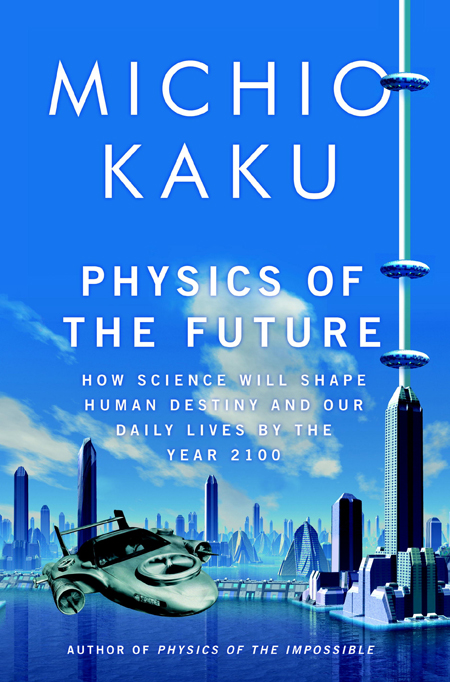
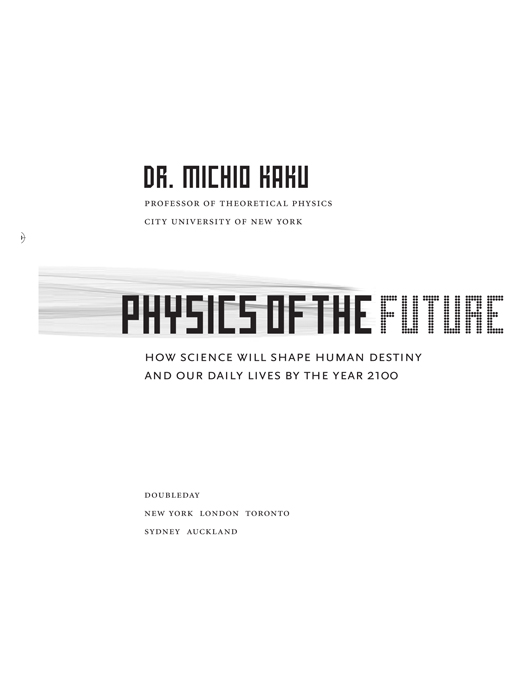

Copyright 2011 by Michio Kaku
All rights reserved. Published in the United States by Doubleday, a division of Random House, Inc., New York, and in Canada by Random House of Canada Limited, Toronto.
www.doubleday.com
DOUBLEDAY and the DD colophon are registered trademarks of Random House, Inc.
constitutes an extension of this copyright page.
LIBRARY OF CONGRESS CATALOGING-IN-PUBLICATION DATA
Kaku, Michio.
Physics of the future : how science will shape human destiny and
our daily lives by the year 2100 / Michio Kaku.1st ed.
p. cm.
Includes bibliographical references.
1. ScienceSocial aspectsForecasting. 2. ScienceHistory21st century. I. Title.
Q175.5.K257 2011
303.4830112dc22
2010026569
eISBN: 978-0-385-53081-1
v3.1
ALSO BY THE AUTHOR
Physics of the Impossible
Parallel Worlds
Hyperspace
Visions
Einsteins Cosmos
Beyond Einstein
To my loving wife, Shizue,
and my daughters, Michelle and Alyson


I would like to thank those individuals who have worked tirelessly to make this book a success. First, I would like to thank my editors, Roger Scholl, who guided so many of my previous books and came up with the idea for a challenging book like this, and also Edward Kastenmeier, who has patiently made countless suggestions and revisions to this book that have greatly strengthened and enhanced its presentation. I would also like to thank Stuart Krichevsky, my agent for so many years, who has always encouraged me to take on newer and more exciting challenges.
And, of course, I would like to thank the more than three hundred scientists I interviewed or had discussions with concerning science. I would like to apologize for dragging a TV camera crew from BBC-TV or the Discovery and Science channels into their laboratories and thrusting a microphone and TV camera in front of their faces. This might have disrupted their research, but I hope that the final product was worth it.
I would like to thank some of these pioneers and trailblazers:
Eric Chivian, Nobel laureate, Center for Health and the Global Environment, Harvard Medical School
Peter Doherty, Nobel laureate, St. Jude Childrens Research Hospital
Gerald Edelman, Nobel laureate, Scripps Research Institute
Murray Gell-Mann, Nobel laureate, Santa Fe Institute and Caltech
Walter Gilbert, Nobel laureate, Harvard University
David Gross, Nobel laureate, Kavli Institute for Theoretical Physics
the late Henry Kendall, Nobel laureate, MIT
Leon Lederman, Nobel laureate, Illinois Institute of Technology
Yoichiro Nambu, Nobel laureate, University of Chicago
Henry Pollack, Nobel laureate, University of Michigan
Joseph Rotblat, Nobel laureate, St. Bartholomews Hospital
Steven Weinberg, Nobel laureate, University of Texas at Austin
Frank Wilczek, Nobel laureate, MIT
Amir Aczel, author of Uranium Wars
Buzz Aldrin, former NASA astronaut, second man to walk on the moon
Geoff Andersen, research associate, United States Air Force Academy, author of The Telescope
Jay Barbree, NBC news correspondent, coauthor of Moon Shot
John Barrow, physicist, University of Cambridge, author of Impossibility
Marcia Bartusiak, author of Einsteins Unfinished Symphony
Jim Bell, professor of astronomy, Cornell University
Jeffrey Bennet, author of Beyond UFOs
Bob Berman, astronomer, author of Secrets of the Night Sky
Leslie Biesecker, chief of Genetic Disease Research Branch, National Institutes of Health
Piers Bizony, science writer, author of How to Build Your Own Spaceship
Michael Blaese, former National Institutes of Health scientist
Alex Boese, founder of Museum of Hoaxes
Nick Bostrom, transhumanist, University of Oxford
Lt. Col. Robert Bowman, Institute for Space and Security Studies
Lawrence Brody, chief of the Genome Technology Branch, National Institutes of Health
Rodney Brooks, former director, MIT Artificial Intelligence Laboratory
Lester Brown, founder of Earth Policy Institute
Michael Brown, professor of astronomy, Caltech
James Canton, founder of Institute for Global Futures, author of The Extreme Future
Arthur Caplan, director, Center for Bioethics, University of Pennsylvania
Fritjof Capra, author of The Science of Leonardo
Sean Carroll, cosmologist, Caltech
Andrew Chaikin, author of A Man on the Moon
Leroy Chiao, former NASA astronaut
George Church, director, Center for Computational Genetics, Harvard Medical School
Thomas Cochran, physicist, Natural Resources Defense Council
Christopher Cokinos, science writer, author of The Fallen Sky
Francis Collins, director of the National Institutes of Health
Vicki Colvin, director of Biological and Environmental Nanotechnology, Rice University
Neil Comins, author of The Hazards of Space Travel
Steve Cook, director of Space Technologies, Dynetics, former NASA spokesperson
Christine Cosgrove, author of Normal at Any Cost
Steve Cousins, president and CEO, Willow Garage
Brian Cox, physicist, University of Manchester, BBC science host
Phillip Coyle, former assistant secretary of defense, U.S. Defense Department
Daniel Crevier, author of AI: The Tumultuous History of the Search for Artificial Intelligence, CEO of Coreco
Ken Croswell, astronomer, author of Magnificent Universe
Steven Cummer, computer science, Duke University
Mark Cutkosky, mechanical engineering, Stanford University
Paul Davies, physicist, author of Superforce
Aubrey de Gray, Chief Science Officer, SENS Foundation
the late Michael Dertouzos, former director, Laboratory for Computer Science, MIT
Jared Diamond, Pulitzer Prize winner, professor of geography, UCLA
Mariette DiChristina, editor in chief, Scientific American
Peter Dilworth, former MIT AI Lab scientist
John Donoghue, creator of BrainGate, Brown University
Ann Druyan, widow of Carl Sagan, Cosmos Studios
Freeman Dyson, emeritus professor of physics, Institute for Advanced Study, Princeton
Jonathan Ellis, physicist, CERN
Daniel Fairbanks, author of Relics of Eden
Timothy Ferris, emeritus professor at the University of California, Berkeley, author of Coming of Age in the Milky Way
Maria Finitzo, filmmaker, Peabody Award winner, Mapping Stem Cell Research
Robert Finkelstein, AI expert
Christopher Flavin, WorldWatch Institute
Louis Friedman, cofounder, Planetary Society
James Garvin, former NASA chief scientist, NASA Goddard Space Flight Center
Evalyn Gates, author of
Font size:
Interval:
Bookmark:
Similar books «Physics of the Future»
Look at similar books to Physics of the Future. We have selected literature similar in name and meaning in the hope of providing readers with more options to find new, interesting, not yet read works.
Discussion, reviews of the book Physics of the Future and just readers' own opinions. Leave your comments, write what you think about the work, its meaning or the main characters. Specify what exactly you liked and what you didn't like, and why you think so.

